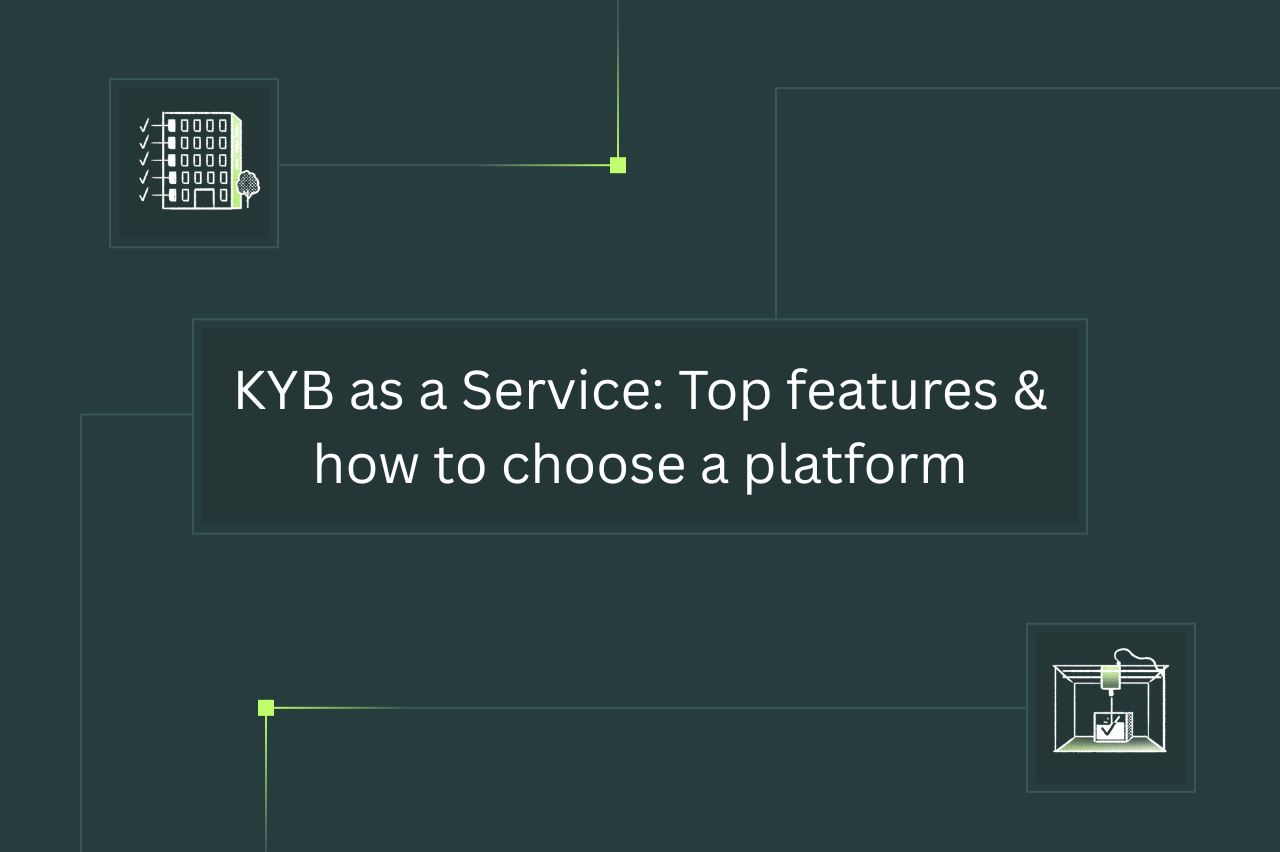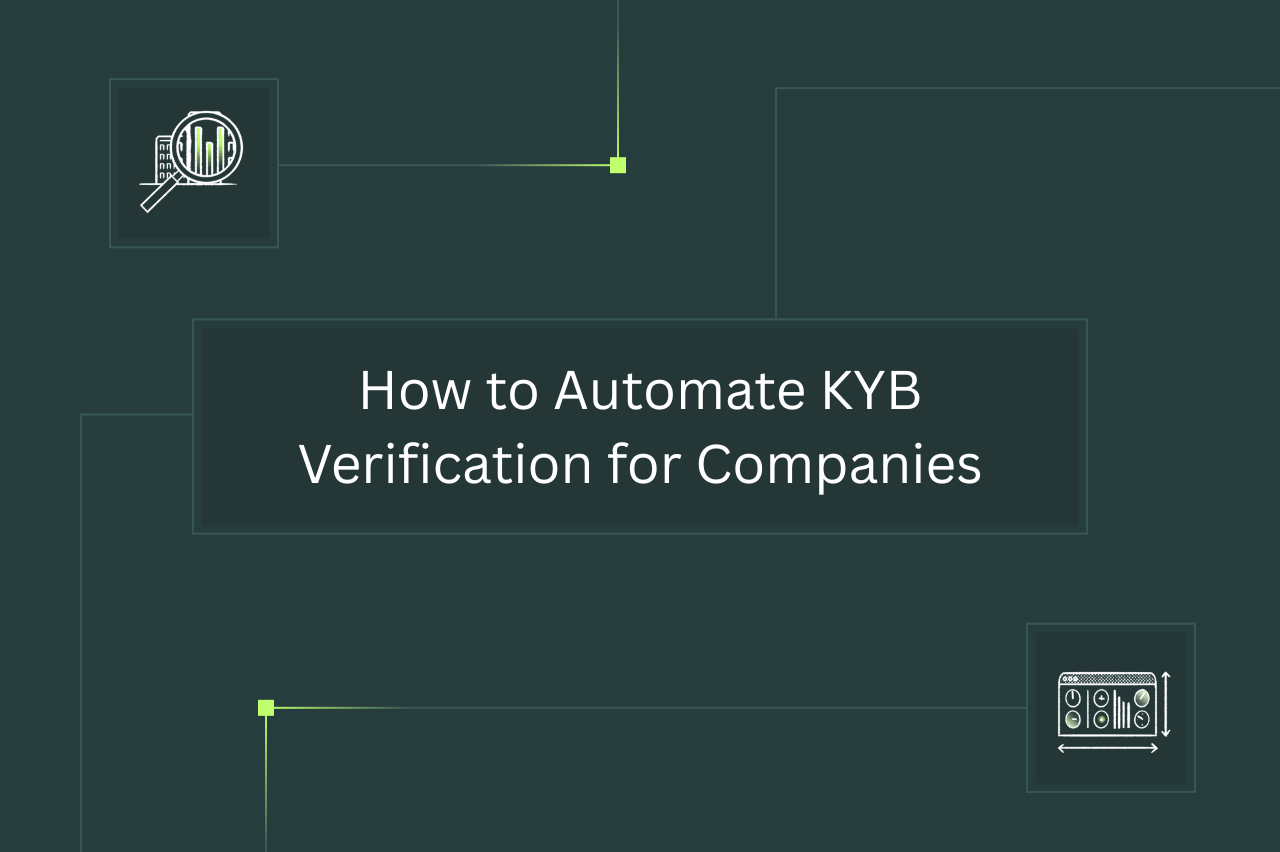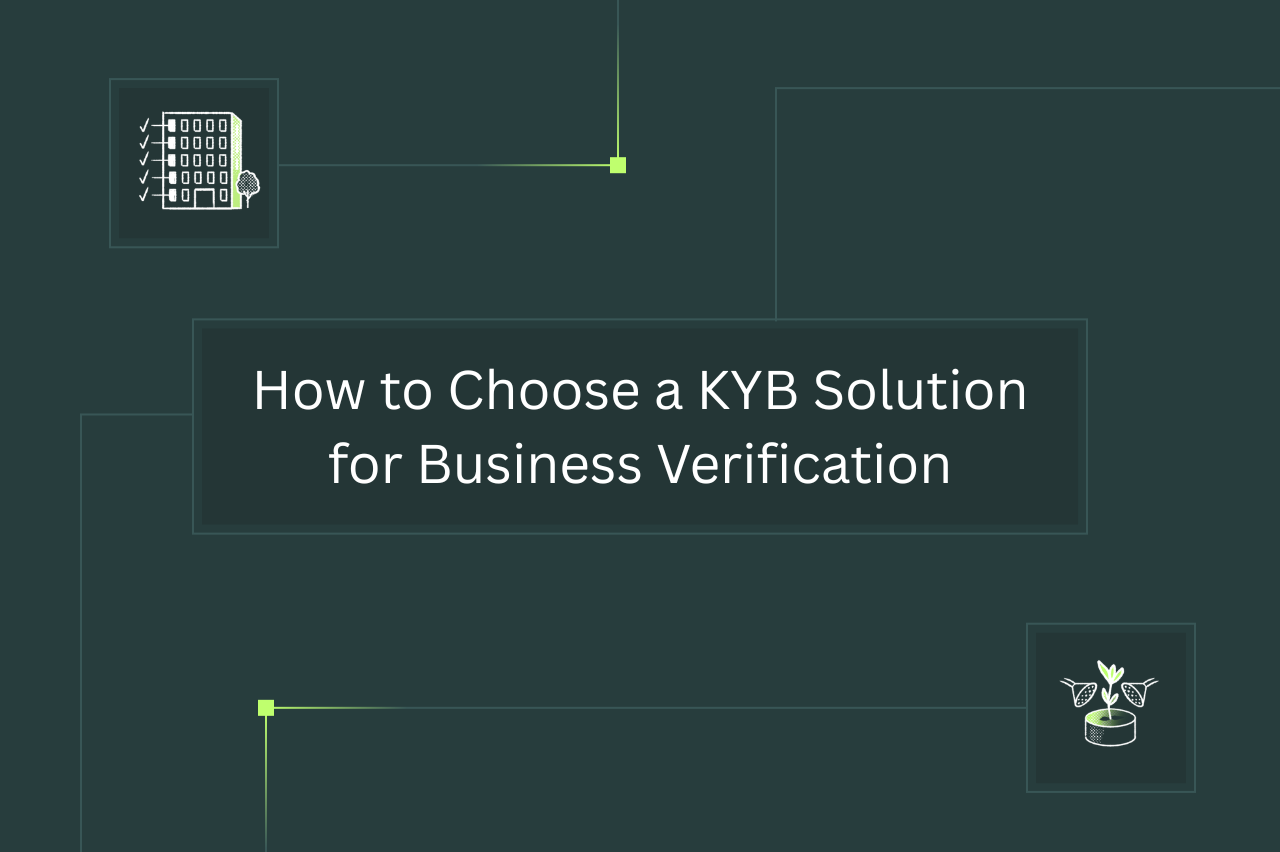In brief:
- KYB as a Service refers to a ready-made suite of business verification software sold by a third party, as opposed to a KYB system a company builds and uses itself.
- Partnering with a KYB as a Service provider is easier than building a KYB program from the ground up because it saves you time, money, human resources, and hassle from integrating different systems, programming regulation-based rules, and making updates based on regulation & client information changes.
- KYB as a Service provider can thoroughly verify the identities of businesses and their beneficial owners, detect critical risk signals so you can weed out bad actors early, automate tedious tasks so they get done faster and with fewer errors, and seamlessly integrate into your existing tech stack.
As of the late 2010s, it’s no longer sufficient for financial institutions to only verify the identities and assess the risks of individual people as customers. They must now also verify that business clients are legitimate companies: properly registered and not being used as fronts for illegal activities. They must also check the beneficial owners of a business are who they claim to be, and aren’t involved in unlawful dealings.
To cope with these extra compliance obligations – colloquially known as “Know Your Business”, or “KYB” – many FIs are purchasing ready-made KYB as a Service platforms from third-party vendors instead of building their own programs from scratch. This article discusses the advantages of doing so, what to look for when choosing between KYB as a Service tools, and who the prime KYB as a Service vendors are on the market today, by covering:
- What is KYB as a Service?
- Benefits of utilizing KYB as a Service over building your own compliance program
- Top features to look for in a KYB as a Service provider
- Top 3 KYB as a Service Providers
First, we will clarify what we mean by KYB as a Service.
KYB as a Service refers to software provided by a third party to help companies comply with business identity verification - or “Know Your Business” - regulations. The “as a service” part refers to how the software is built and managed by a third party, not the company actually using the software.
The difference between KYC and KYB services
KYC (Know Your Customer) and KYB are both processes designed to protect your FI from being used by your clients and partners for money laundering or other financial crimes. The main difference between the two is that KYC services are mainly for verifying the identities of individual people as customers.
KYB services are more recent inventions, designed to verify that businesses are properly-registered legal entities operating within jurisdictional laws. This includes checking that the people who own, control, and/or benefit from a business are who they say are and aren’t involved in illegal activities.
{{gated-content-block="/insights/kyb-for-every-stage-of-a-business"}}
It’s possible to create a system for managing your FI’s KYB obligations from scratch, but it’s much easier to just buy a ready-made software solution. Here’s why:
- Saves time: Building a KYB service from scratch takes a lot of time, as there are a lot of things that need to be considered. It’s much faster to just set up a pre-made system so you can quickly get back to your main operations.
- Saves human resources: You’ll likely need programmers, engineers, and other employees (or at least contractors) with specialized skills to build a KYB platform from the ground up. Buying a pre-made one saves you from having to recruit these extra people when you might otherwise not need to.
- Saves money: If you build a KYB solution by yourself, you’ll likely need to bring together many separate technical parts and systems. This will cost a lot of money (as will hiring the people to put it all together, as discussed in the previous point). It’s often cheaper to buy KYB services, where all the necessary elements are already together in a bundle.
- Easy integration: Another hurdle with building a do-it-yourself KYB program is making sure each of the separate components integrates with each other, as well as your existing tech stack. KYB as a Service platforms can help avoid this pitfall, as their systems are designed to all work together from the get-go, and many are modular enough to fit several different tech stacks.
- Compliant from the get-go: Another thing to think about with a self-made KYB system is that you’ll have to program in all the rules and procedures to be compliant with current regulations. There can be serious consequences if you don’t do this right and are found to be non-compliant. A KYB as a Service will have this work done for you ahead of time.
- Hands-free updates: The third party managing a KYB service updates KYB/KYC-related information in the system on businesses, people, and regulations as it changes in the real world. If you build an in-house platform, you have to check for and make these updates yourself. This is not only time-consuming, but can also put you at risk of non-compliance if you miss a critical update.
To sum up: KYB as a Service is a cost-effective compliance solution that saves you the time and hassle of building a KYB platform yourself. That would involve shopping around for the right components, hiring the necessary people to put them together correctly, and programming them to meet current compliance standards. A KYB as a Service also takes the burden off you of having to manually check for updates to regulations, or to the risk statuses of your clients.
All of this helps you balance growth and profitability with minimizing risk exposure (both criminal and regulatory). For more on how to do this – and why it’s so critical – in today’s tech market, read our e-book below on implementing KYB in every stage of your business.
So what does a KYB as a Service solution need to be effective for your FI’s compliance program? We’ve identified four general categories in which you should look for features.
Business verification
The main function you want in KYB as a Service is the ability to properly verify that a business has a physical presence, is properly registered, and actually does what it claims to do. You also need the service to confirm who owns, controls, and/or benefits from that business, and that they’re real people who are who they say they are.
There are several pieces of information a service can use to complete this validation. They include:
- Business name – Does the business’s name appear in a registration database, and does it match the rest of the business’s information?
- Address – Does the business have a physical headquarters (or other branches) that you can visit?
- Secretary of State filings – Has the business submitted all necessary documents for being recognized as a legal entity to a Secretary of State office (and/or other registration authority)?
- TIN – Has the business been assigned an identification number by the IRS (or other tax authority) so its tax filings and payments can be tracked?
- People – Who has significant ownership interest, decision-making authority, or day-to-day managerial power in the company? Do their identifying details match those of actual people?
Make sure the KYB as a Service system you choose can find all of this information at a minimum.
Risk signals
Verifying that a business and its associated people are who they claim to be is only half of what KYB entails. The other half is assessing whether or not they pose significant risks to your operations, legal standing, and/or reputation. For example:
- Do you know how to avoid working with businesses in prohibited industries?
- Is the business in legal trouble, or does it have a history of being in legal trouble?
- Can you get a data report on the business’s liens or bankruptcy filings?
- Can you screen for adverse media coverage of the business?
- Have you checked relevant AML watchlists to see if the business is listed?
- Can you perform adequate risk assessment for politically exposed persons?
A KYB as a Service solution should be able to help analyze a business client’s risk profile to quickly determine whether they fall within your company’s risk appetite. It can do so through features such as:
- Instant composite score – Get an instant measure of how legitimate and/or risky a business is based on various factors, delivered as a rating on a scale from 0 to 100.
- Risk reason codes – Understand which attributes of a business contribute to how risky or legitimate it’s judged to be, based on a list of pre-defined categories.
- Missing data flags – Detect if businesses are missing critical identification details or registration documents, which can be a major warning of risk or illegitimacy.
Automation capabilities
One of the major reasons to use a software-based KYB system is to automate tedious tasks. Manually performing these tasks takes extra time – and you either need extra employees to do them, or for your existing employees to take time to do them instead of fulfilling their main work functions.
Additionally, having employees perform precision-demanding tasks manually increases the risk of human error. This can lead to costly mistakes down the road if decisions are made using faulty analysis based on incorrect information.
With certain tasks automated by computers, however, they get done faster and with less chance of mistakes. Additionally, your employees are freed up to work on assignments that grow your business – or at least complex, high-priority KYB tasks that require human analysis.
Even then, some KYB as a Service providers will allow you to outsource these difficult tasks to them. Having this third-party “analyst in the loop” allows you to automate risk and identity verification reviews that you’d otherwise have to do manually.
{{related-content-block="/blog/kyb-automation"}}
Seamless integration
A KYB program isn’t really helping you if it’s taking as many resources to put it together and connect it with your existing systems as it’s saving you by automating verification and analysis jobs.
That’s why purchasing a KYB as a Service solution is usually simpler. They are designed so their various parts work together from the get-go, and many are flexible enough to slot into virtually any tech stack. This cuts down on the time and effort needed to set up and onboard the software, letting you hit the ground running with your compliance operations.
Here are three of the top KYB as a Service vendors on the market today, along with explanations of how well they deliver on the features we highlighted above.
1. Middesk
Middesk provides identity verification for businesses across the United States, with a focus on the detection of risk signals. It can look at a wealth of potential indicators of risk regarding people and businesses, including sanctions lists, watchlists, industry classifications, web presence, litigations, bankruptcies, liens, adverse media, and more.
Middesk’s biggest strength is that it draws first-party information directly from U.S. government sources to provide reliable business identity verification. This includes information on businesses’ ultimate beneficial owners, via Middesk’s integration with Socure. This gold standard of data quality makes automated KYB decision-making much faster and more frequent – so much so that Middesk is trusted by over 500 leading banks and fintechs.
2. Ondato
Ondato provides flexibility in terms of identity verification for businesses and their associated people. You can use photo-based biometrics, video-based liveness detection, physical document scanning, or a combination of any of those. While its “build your own process” philosophy is convenient, it can be expensive and somewhat difficult to set up. Its scope of risk-related information is also somewhat limited.
3. iDenfy
iDenfy is a comprehensive business and individual identity verification service, with plenty of customization options. It’s able to identify over 2500 kinds of documents from over 190 countries, and has a great customer service team that even helps with manual reviews. With that said, its ability to detect risk signals is somewhat limited, and all of the potential customizations can slow down the onboarding or verification process (which your customers may not like).
Don’t unnecessarily spend time, money, and other resources trying to piece together a KYB program by yourself. With our Verify and Signal products, Middesk does the heavy lifting when it comes to business identity verification and risk assessment. This lets you stop worrying about compliance – and start focusing on growth and innovation – sooner.
See how Middesk could be your KYB as a Service solution today by booking a demo. Or if you don’t want to wait, check out our on-demand product demo of Middesk Verify right now to see how it fits into your KYB process:
{{gated-content-block="/events/productdemo-verify-june-2025"}}









